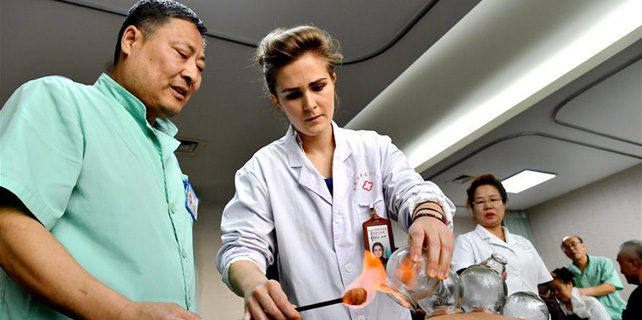Cuba drives digitalization with help of Chinese technology
HAVANA — A brand new assembly plant on the outskirts of Havana is helping propel the digitalization of the long-languishing Caribbean country, aiding it to catch up and keep pace with a technology-centered 21st century.
Inaugurated in December 2016, the plant assembles laptops and tablets using Chinese-made components and technologies, which is the first of its kind in Cuba.
Cooperating with Chinese firm
Liena Herman is one of the young employees at the plant operated by Cuba's Industrial Company for Computers, Communications and Electronics (GEDEME).
"I saw an ad in the newspaper that they were looking for young people to train for this project. I had nothing to do with computer science before, but I was enthusiastic about being part of something new and important for the country. So I applied and was chosen," Herman told Xinhua.
The former social worker has already been promoted to head one of the two production lines at the plant.
The innovative project was conceived by GEDEME in partnership with Chinese firm Haier and Cuba's University of Computer Sciences (UCI).
"This project arose from cooperation with Chinese company Haier based on an agreement over the next three years, with raw materials supplied by that corporation," Fernando Fernandez, head of IT solutions at GEDEME, told Xinhua.
To date, the plant has rolled out more than 3,500 laptops and 3,580 tablets, mainly to supply state-run companies and government agencies. In the future, the products will probably be sold at stores.
The production line features Core i3, Core i5 and Celeron laptops installed with the sixth-generation processors.
"In addition, we are assembling two models of tablets, an 8-inch and a 10-inch equipped with accessories, (protective) cover and a keyboard that make them very useful and modern products for our nation," said Fernandez.
Jose Antonio Sanchez, who heads the assembly line, said he believes the plant's products will make a significant contribution to the Cuban society.
"I think the laptops and tablets produced in this plant will give young people, schools, doctors and other professionals an important work tool made with good quality, services and properties at an affordable price," the 21-year-old said.
Learning from Chinese technology
Significantly, the products' operating systems and applications are produced by Cuba's UCI.
"That decision was due to the current global scenario of spying and cyber security. For us to be able to guarantee that our products are Cuban designed and that the operating systems are 100 percent Cuban, (we have to) endow them with a higher degree of security," said Fernandez.
While the raw materials are imported from China, the software and the assembly line make the laptops truly "national" products, according to Fernandez.
"We assemble laptops and tablets adjusted to the current conditions of our country...and we also personalize the units with applications and configurations most suitable to each sector," he said.
Herman and Sanchez, along with some 20 fellow employees, assemble and test each unit before it is packaged.
"The line where I work is where the first part of the laptop is assembled by installing the RAM memory, hard disk, Wi-Fi card and other accessories, as well as its serial number," said Sanchez.
Herman carries out technical tests on the products to make sure the Ethernet, Wi-Fi and Bluetooth connectivity all work as planned.
She began working at the plant in January. "Chinese training personnel taught us how to assemble tablets and laptops. I started as an operative, but they noted my skills and sense of responsibility. And that's why I was promoted to head the line," she said.
The $230,000 facility has the capacity to assemble 120,000 laptops and tablets a year, or 500 per day, and is designed to eventually have 80 employees.
Haier will hand over the facility to GEDEME once the agreement terminates.
Expansion for wider connectivity
In the meantime, the plant's products have been very popular, with high demand from the state sector.
"This year we plan to assemble around 50,000 units whose components are already in Cuba. We'll continue working on expansion for 2018 to inaugurate a plant similar to this one for PCs and servers," said Fernandez.
Cuba has one of the lowest internet penetration rates in Latin America. In 2015, the number of computers registered in Cuba stood at 1,071,600, of which only about half were connected to the internet, according to the National Bureau of Statistics and Information (ONEI).
The state-owned Telecommunications Company of Cuba (ETECSA) has strived to increase connectivity on the island. Currently, there are more than 1,000 public Wi-Fi hotspots around the country and another 180 will be added this year.
ETECSA has recently began offering home internet access with a pilot program launched in Havana's historic center in December 2016. So far, 358 clients have signed up for the service.
With China's help, Cuba is poised to boost connectivity, which will be key to the country's future development.









